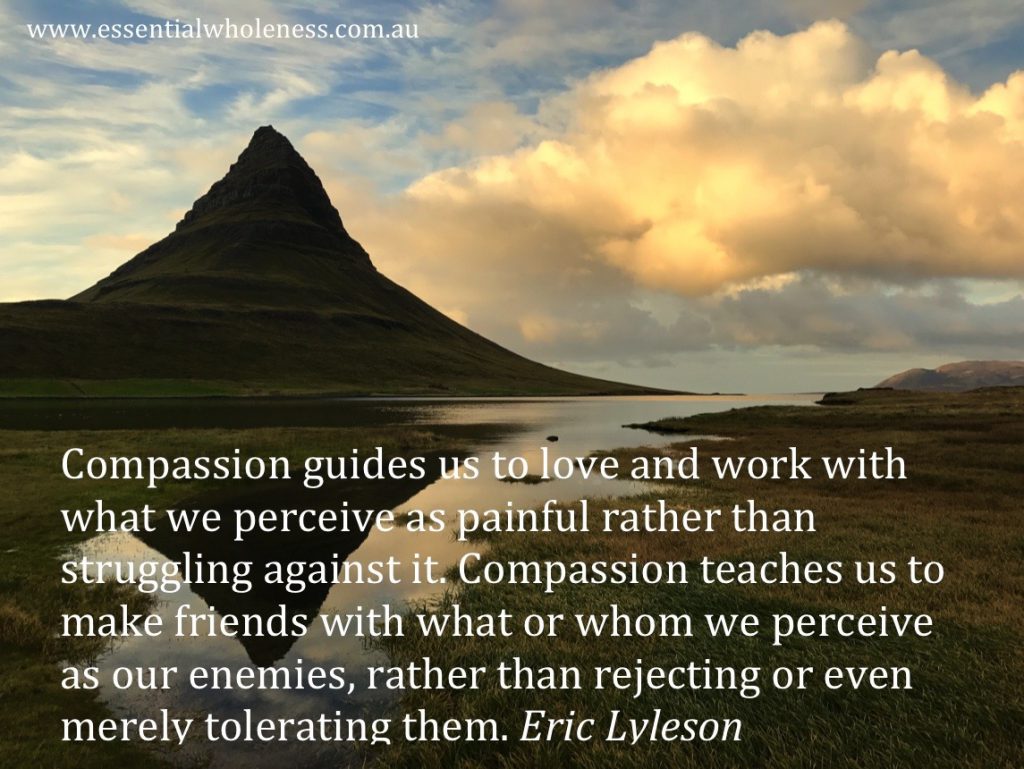Compassion leads us to greater awareness of our suffering
Compassion, in its deepest sense, is the experience of no separation between our awareness and whatever is arising in awareness, inside and out. Compassion allows us to deeply listen, with warmth and a generous heart, to whatever arises. Listening and attending with compassion to a fellow human being tends to encourage that person to open up more deeply to the source of their suffering and reveal more to us. The same can happen in the initial stages of meditation. Because of the oppressive nature of our coping mechanisms, we aren’t aware of the extent of our suffering, or the lack of the happiness and freedom.
Only to the extent that we are aware of our suffering will we be able to liberate ourselves from the habits of mind and body that imprison us. Compassion guides us to love and work with what we perceive as painful rather than struggling against it. Compassion teaches us to make friends with what or whom we perceive as our enemies, rather than rejecting or even merely tolerating them.
Saying, “I can’t stand you, but I’ll try to put up with you the best I can,” imposes a guilt trip on the person in question. Merely coping with what we perceive as causing us suffering perpetuates the perception of separateness from the rest of the universe. Coping is essentially a form of blaming someone or something for making us suffer, and being unwilling to take responsibility for our own well being; it encourages us to think some aspects of creation are good (deserving of love) and some bad (undeserving of love).
Mindfulness and compassion lead us to greater awareness of the nature of our suffering. We can become aware of aches and tensions on the body, disturbing, anxious thoughts, relating to painful events of the past or feared events of the future, that distract us from experiencing the fullness of the present moment. Meditation techniques serve as a vehicle to carry us through these difficulties on the path to experiencing our wholeness. Through the practice of meditation we can redirect the energy invested in automatic coping mechanisms into self-supporting processes of learning, evolution and resting in our essential wholeness.
We use our conscious intention to focus and then soften focus of mindfulness enough to embrace our arising experience with compassion and love. In doing this we discover that disturbing thoughts and emotions, like disturbing people or occurrences in our lives, are not inherently bad. Rather, when they are acting in problematic ways, they are merely acting out their own sense of fear or lovelessness.
Fear or a sense of lovelessness arises when we are out of touch with our wholeness. The book, A Course in Miracles describes just two basic human communications — they are expressions of love, or calls for love (requests for help). When we react to others, or to our own internal experiences out of fear, by either trying to fight them off or run from them, we are perpetuating the myth that the world — other people, myself or my thoughts — is inherently bad.
Whatever is labeled bad is therefore not to be accepted and embraced with love, but rather is denied, rejected, ignored or disowned. The basic structure of coping mechanisms (ego defenses) is to maintain the limited perception of ourselves, which we do at the cost of the ecology of our essential wholeness.

Trying too hard to be compassionate, rather than resting in compassion can lead to ruminating about how to help others or ourselves by improving something outward. Denying our innate strength can mean an indulgence in our emotions and lead us to self-pity. Let compassion be effortless.
By simply resting in loving compassion and embracing whatever disturbances arise, the fears of judgment or rejection are calmed, and we may have the realization that there wasn’t anything to fear. Just as a parent’s loving arms and calm presence is able to help their frightened child to realize their nightmare was only a dream and there is nothing to be frightened of. Sitting compassionately with someone (including ourselves) sends the implicit reminder that his too will pass, and in the meantime we know that you are loved and appreciated no matter what happens.
Compassion comes from the recognition that everything is part of the whole and has a place and a function. At phase TWO of the Enneagram of change the quality of our lives depends on attending to the needs of our emergent selves. Compassion holds everything with love. When we become conscious of emerging needs for healing or growth, our compassionate nature attends to those needs. Compassion can be fierce or gentle, but it always attends our deepest needs while tapping into the capabilities needed to relate more fully to life.
Compassion leads us to greater awareness of the nature of our suffering and brings healing by attending with love what gets in the way of expeiencing your essential wholness.
This is an excerpt from Essential Wholeness, Integral Psychotherapy, Spiritual Awakening and the Enneagram
Learn more about self compassion and mindfulness in our courses and retreats.


